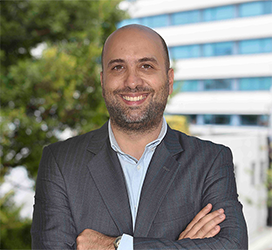Dr. Elias Chalhoub
Chair of the Department of Biology
PhD in Molecular Genetics - University of Montpellier II, France


The Saint George University of Beirut (SGUB), built on established traditions of education, healthcare, and community service, located adjacent to Saint George Hospital University Medical Center, in the heart of Beirut, is a vibrant place to learn, develop, and establish solid foundations for future careers and aspirations.
We are pleased that you have chosen to learn more about undergraduate studies at SGUB, and we hope that you will apply during the coming months.
Please examine the provided information about the academic requirements, procedures, and deadlines before you complete your application.
All our classrooms are designed for student engagement; our faculty members are trained in active learning pedagogies. Through active learning and engagement, students take ownership of their education, fostering critical thinking and problem-solving abilities, communication skills, and teamwork.
At SGUB, we prioritize Outcome-Based Education and Assessment. By defining clear learning outcomes in every course and for the program, we provide the platform for the development of crucial competencies for each individual student. Students can also use the learning outcomes assessments as vehicles to drive their own growth.
Our department boasts a talented and diverse group of faculty members who bring a wealth of knowledge and expertise to the classroom, creating an engaging and intellectually stimulating learning environment. Our faculty members are actively engaged in research and industry collaborations, ensuring that our curriculum remains at the forefront of technological advancements. Through integrating theoretical knowledge with practical application, our faculty members foster innovation, critical thinking, and problem-solving skills among our students.
Our department offers several unique and innovative mechanisms to develop students beyond their curricula.
Undergraduate Research Assistantships
As part of our commitment to fostering a research-driven environment, we offer research assistantship opportunities to motivated undergraduate students. Research assistants work closely with faculty members on cutting-edge research projects, contributing to advancements in the field. This hands-on experience allows students to develop research skills, gain exposure to state-of-the-art methodologies, and collaborate with leading researchers. Research assistantships enhance students' academic portfolios and are potential avenues for peer-reviewed publication.
Undergraduate Student Mentoring
Our peer-mentoring program provides students with the opportunity to receive additional assistance and guidance from their fellow students who have excelled in their courses. Peer mentors are carefully selected based on their academic achievements and teaching abilities; they provide personalized tutoring sessions, offer study tips and strategies, and help students build confidence in their understanding of the subject matter. Peer mentoring is a valuable resource that promotes collaborative learning and academic success among our students.
As a recognition of their commitment to supporting their peers, students who actively participate in Undergraduate Student Mentoring receive certificates of achievement from the Faculty of Arts and Sciences. These certificates serve as a testament to their academic excellence and valuable contributions to the learning community.
Undergraduate Course Assistantships
Undergraduate Course Assistants are selected based on their academic achievements and teaching abilities; they assist faculty members in delivering courses that the students had already taken and demonstrated proficiency. Undergraduate Course Assistants develop teaching and communication skills, and demonstrate a passion for fostering the growth of their fellow students.
As a recognition of their commitment, students who serve as Undergraduate Course Assistants receive certificates of achievement from the Faculty of Arts and Sciences. These certificates serve as a testament their academic excellence and valuable contributions to the learning community.
Student Life
Learning extends beyond the classroom, and student life at our department reflects our commitment to holistic development. Students can participate in various clubs and events. These opportunities foster collaboration, leadership, and personal growth, while also building a strong sense of community among students.
Facilities and Resources
We provide state-of-the-art facilities and resources to support teaching, research, and innovation. Our laboratories and state-of-the-art classes offer students and faculty members the tools they need to explore, experiment, and excel in their respective areas of interest.
Get in Touch
If you have any questions, or would like more information about the programs and opportunities available, please do not hesitate to contact us at info@sgub.edu.lb. Our dedicated team is here to assist you in any way we can.
At SGUB, we have made it our goal to help you realize yours by offering a wide range of Scholarships and Financial Aid plans to qualified students facing financial difficulties regardless of religion, culture, gender, or nationality. As a service to our community and society, we will provide financial assistance to ensure that students can afford a premier education at SGUB.
For more information about Financial Aid Application please contact us on: financial-aid@sgub.edu.lb
